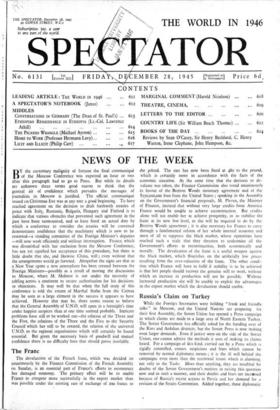The Franc
The devaluation of the French franc, which was decided on unanimously by the Finance Commission of the French Assembly on Sunday, is an essential pan of France's efforts to reconstruct her damaged economy. The primary effect will be to enable France to compete more successfully in the export market than was possible under the existing rate of exchange of 200 francs to
the pdund. The rate has now been fixed at 48o to the pound, which is certainly more in accordance with the facts of the economic situation. At the same time that the decision to de- valuate was taken, the Finance Commission also voted unanimously in favour of the Bretton Woods monetary agreement and of the $55o,000,000 loan from the United States ; speaking in the Assembly on the Government's financial proposals, M. Pleven, the Minister of Finance, insisted that without very large credits from America France would be unable to achieve reconstruction. But credits alone will not enable her to achieve prosperity, or to stabilise the franc at its new low level, as she will be required to do by the Bretton Woods agreement ; it is also necessary for France to carry through a fundamental reform of her whole internal economy and most of all to suppress the black market, whose operations have reached such a scale that they threaten to undermine all the Government's efforts at reconstruction, both economically and morally. The devaluation of the franc is a useful weapon against the black market, which flourishes on the artificially low prices resulting from the over-valuation of the franc. The other condi- tion which France will have to fulfil if stability is to be achieved is that her people should recover the genuine will to work, without which an increase in production will not be possible. Without increased production she will be unable to exploit the advantages in the export market which the devaluation should confer.






























